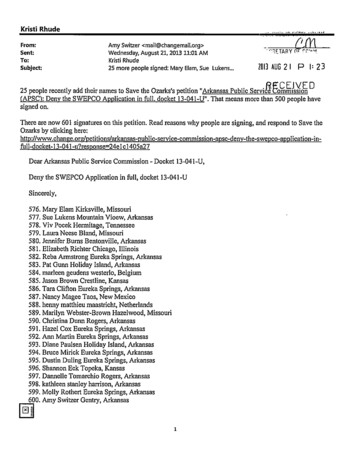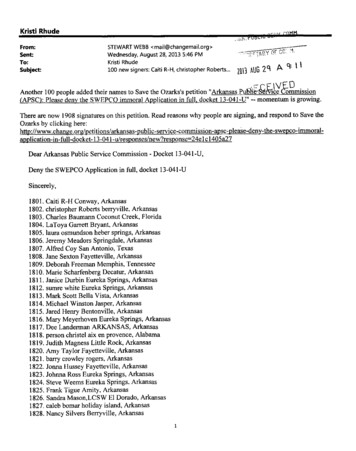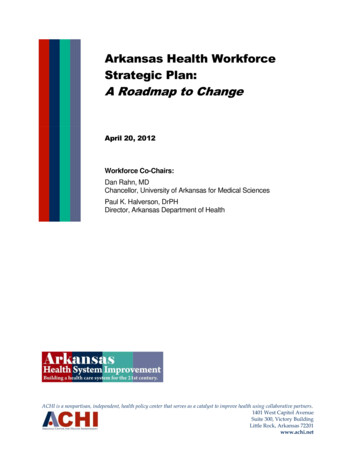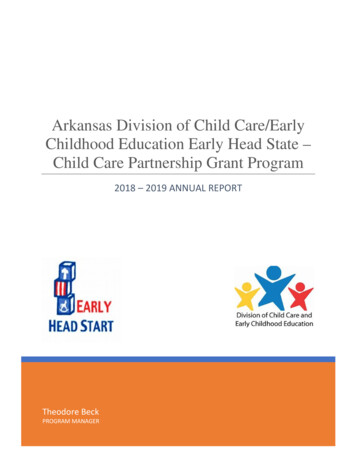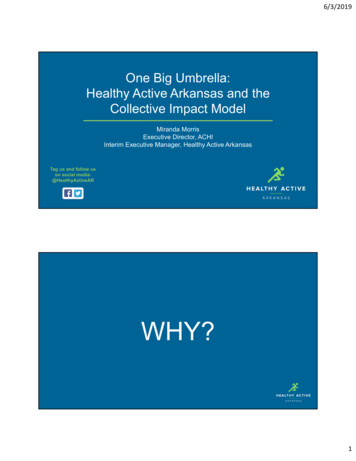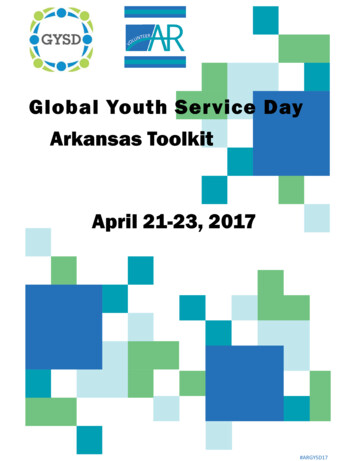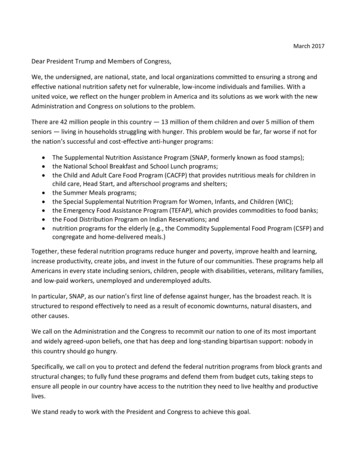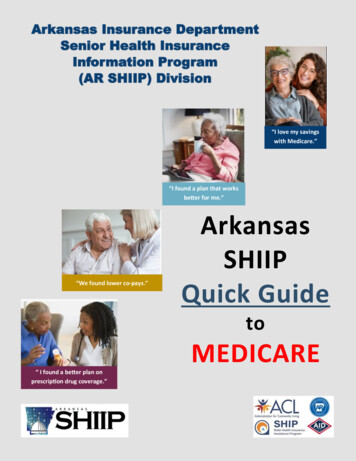
Transcription
Arkansas Insurance DepartmentSenior Health InsuranceInformation Program(AR SHIIP) Division“I love my savingswith Medicare.”“I found a plan that worksbetter for me.”“We found lower co-pays.”ArkansasSHIIPQuick GuidetoMEDICARE“ I found a better plan onprescription drug coverage.”
Arkansas Insurance DepartmentSenior Health Insurance Information Program(AR SHIIP) DivisionAR SHIIP’SMissionStatementOur mission is to offerMedicare beneficiariesfree, confidential,unbiased andeducational informationabout Medicare.AR SHIIP’s local Medicarecounselors offeranswers to Medicare andother insurancequestions.AR SHIIP’sMissionStatementCallArkansas SHIIP1(800)224-6330
Arkansas Insurance DepartmentSenior Health Insurance Information Program(AR SHIIP) DivisionAR SHIIP is funded by the Administration for Community Living, anagency of the U.S. Department of Health and Human Services.We are here to aid you in saving money and making informeddecisions about Medicare information.Our certified Medicare counselors offer in-person and over the phoneassistance regarding Medicare questions.AR SHIIP partners will not sell or solicit any type of insurance orprovide legal advice. We offer unbiased information and resourcesabout Medicare and assist applicants with limited income apply forLow Income Subsidy (LIS) and/or Medicare Saving Program (MSP).1 Commerce WayLittle Rock, AR 72202Toll Free: 1-800-224-6330www.insurance.arkansas.govFIND US ON FACEBOOK AND TWITTERThis publication was created by the State of ArkansasInsurance Department and AR SHIIP Division, supportedin part by grant number 90SAPG0077 from the U.S.Administration for Community Living, Department ofHealth and Human Services, Washington, D.C. 20201.
What’sNew?Coronavirus disease 2019 (COVID-19)Medicare is committed to getting you the information you need on COVID–19. For themost up-to-date information on coverage and benefits, visit Medicare.gov or call1-800-MEDICARE (1-800-633-4227). TTY users can call 1-877-486-2048.Lower out-of-pocket costs for insulinIf you join a Medicare drug plan that participates in the “Part D Senior Savings Model,” youcould save hundreds of dollars each year in out-of-pocket costs for insulinMedicare Advantage & End-Stage Renal Disease (ESRD)If you have ESRD, you can join a Medicare Advantage Plan during Open Enrollment(October 15–December 7, 2020). Your plan coverage will start January 1, 2021.Acupuncture for back painMedicare now covers up to 12 acupuncture visits in 90 days forchronic low back painTelehealth & other virtual servicesTelehealth benefits allow you to get medical or health services thatgenerally occur in-person (like office visits and consultations). MedicareImportant!also covers certain virtual services, like E-visits and virtual check-ins.
AR SHIIP Mission Statement . 2AR Insurance Department Senior Health Insurance Information Program . 3What’s New? . 4Getting Started With Medicare . 7When to Enroll . 8Types of Medicare Enrollments . 9Medicare Enrollment Period . 10The Four Parts of Medicare . 11Medicare Part A Premiums and Cost . 12Medicare Part B Premiums and Cost . 132022 Services Covered by Medicare . 14Part B Preventative Screenings and Services . 15What is Medicare Part C . 16Part C - Medicare Advantage . 17Medicare (Part D) Drug Coverage . 18Drug Coverage Rules . . 19Drug Coverage Cost . 20Difference Between Medigap & Medicare Advantage Plans . 21What is Medicare Supplement Insurance (Medigap)? . 22Buyer Beware. 23Buyer Beware (Continued) . 24Buyer Beware/Variables . . 25Special Circumstances For Guaranteed Issue For MEDIGAP . 26Medigap Policies Do Not Cover Everything . 27Types of Medicare Supplement Insurance (Medigap) . . 28
Compare Medigap Plans and Benefits Available . . 29Medigap (Med Supplement) Plans .30Med Sup Under age 65 and Select Plans . .31No Rate Change Medigap Plans .32No Rate Change Med Sup Under age 65 and Closed Plans . . 33What is a Formulary? .34When to Join Medicare Plan . 35How to Drop Medicare Part D and Medicare Advantage . 36Medicare Resources . 37Medicare and The Health Insurance Marketplace . 38Medicare Rights and Protections . 39What is a Advanced Beneficiary Notice of Noncoverage (ABN)? .40Medicare Frequently Asked Questions 41Find a Doctor or Healthcare Provider . 42Medicare Internet Resources 43Helpful Websites and Phone Numbers 44Glossary .45-50
Getting Started with MedicareAR SHIIP’sMissionStatementGetting Medicare is a major milestone. Listed below are 5 importantfacts to help you on your Medicare journey.1. Some people get Medicare automatically, and some have to signup. You may have to sign up if you’re 65 (or almost 65) and notgetting Social Security.2. There are certain times of the year when you can sign up orchange how you get your coverage.3. If you sign up for Medicare Part B when you’re first eligible, youcan avoid a penalty.4. You may be able to get help with your Medicare costsArkansas SHIIP– Senior He5. Shop and compare plans each yearProgram offers Arkansas bunbiased, and educationalSHIIP’shelplocalMedicare couCall AR SHIIP and let a certified Medicare counselor1-800-224-6330understanding Medicare a
How and When do I enroll in Medicare?If you’re close to 65, and notgetting Social Security orRailroad Retirement Board(RRB) benefits, you will haveto sign up for Medicare.Contact Social Security 3months before you turn 65.Medicare enrollment is automaticonly if you are already receivingSocial Security or a RRB benefitscheck. A red white and BlueMedicare card will be sent to you 3months before your 65th birthdayor the 25th month of disabilitybenefits.When you are first eligible for Medicare, you have a 7-month InitialEnrollment Period to sign up for Part A and/or Part B (3 months before,your birthday month and 3 months after your 65th birthday).When you apply for Medicare, you can sign up for Parts A & B. You mustpay a premium for Part B. If you decide to enroll in Part B later on, youmay have to pay a monthly late enrollment penalty for as long as youhave Part B coverage and could have a gap in your health coverage.
Medicare Annual Open EnrollmentOctober 15th Thru December 7th
Medicare Enrollment PeriodsInitial Medicare EnrollmentYou can first sign up for Part A and/or Part B during 7-month period that begins 3 months beforethe month you turn 65 includes the month you turn 65, and ends 3 months after turning 65.General Enrollment PeriodsYou can sign up for Part A and/or Part B during the General Enrollment Period betweenJanuary 1 – March 31 each year if both of these apply:1. You didn't sign up when you were first eligible2. You aren’t eligible for a Special Enrollment Period (see below).Medicare Beneficiaries must pay for Medicare Part B. premiums. Your coverage will start July 1.Individuals may have to pay a higher premium for late enrollment in Part A and/or a higher premiumfor late enrollment in Part B.During the Open Enrollment period October 15 - December 7 you may1. Enroll in a Medicare Part D (prescription drug) plan2. If you currently have a plan, you may change plans.3. In addition, during the seven-week period you can return to traditional Medicare (Parts A and B)from a Medicare Advantage (Part C, managed care) plan,4. Enroll in a Medicare Advantage plan, or change Advantage plans. Coverage elections willbecome effective January 1st.Special circumstances (Special Enrollment Periods)Once your Initial Enrollment Period ends, you have the chance to sign up for Medicare during aSpecial Enrollment Period (SEP). If you're covered under a group health plan based on currentemployment, you have a SEP to sign up for Part A and/or Part B anytime as long as:1. You or your spouse (or family member if you're disabled) work.2. You're covered by a group health plan through the employer or union based on that work.You also have an 8-month SEP to sign up for Part A and/or Part B that starts at one of thesetimes (whichever happens first):1. The month after the employment ends2. The month after group health plan insurance based on current employment endsUsually, you don't pay a late enrollment penalty if you sign up during a SEP.
The Four Parts of MedicarePart A (Hospital Insurance)Helps cover:Inpatient care in hospitalsSkilled nursing facility careHospice careHome health carePart B (Medical Insurance)Helps cover:Services from doctors and other health care providersOutpatient careHome health careDurable medical equipment (like wheelchairs, walkers, hospital beds, and otherequipmentMany preventive services (like screenings, shots or vaccines, and yearly “Wellness” visits)Part C (Medicare Advantage)Private plans “MA Plans," are an “all in one” alternative to Original Medicare.Part D (Drug coverage)Helps cover the cost of prescription drugs (including many recommended shots orvaccines).Plans that offer Medicare drug coverage (Part D) are run by private insurance companiesthat follow rules set by Medicare.Replace your Medicare cardIf you need to replace your Medicare card becauseit’s damaged or lost, log into (or create) your secureMedicare account at Medicare.gov to print or order anofficial copy of your Medicare card. You can also call1-800-MEDICARE (1-800-633-4227) and ask for areplacement card to be sent in the mail. TTY users cancall 1-877-486-2048.
Medicare Part APremiums and CostAR SHIIP’sMissionStatementPremium-free Part AYou usually don't pay a monthly premium for Medicare Part A (HospitalInsurance) coverage if you or your spouse paid Medicare taxes for a certainamount of time while working. This is sometimes called "premium-free Part A."Most people get premium-free Part A.You can get premium-free Part A at 65 if: You already get retirement benefits from Social Security or the RailroadRetirement Board.Arkansas SHIIP– Senior HeYou're eligible to get Social Security or Railroad benefits but haven't filedProgram offers Arkansas bfor them yet.You or your spouse had Medicare-covered government employment.unbiased, and educationalSHIIP’s local Medicare couIf you're under 65, you can get premium-free Part A if:understandingMedicareaYou got Social Security or Railroad RetirementBoard disability benefitsfor 24 months. You have End-Stage Renal Disease (ESRD) and meet certainrequirements.Part A premiumsIf you don't qualify for premium-free Part A, you can buy Part A.If you buy Part A, you'll pay up to 499 each month. If you paid Medicare taxesfor less than 30 quarters, the standard Part A premium is 274.In most cases, if you choose to buy Part A, you must also:Have Medicare Part B (Medical Insurance) Pay monthly premiums for both Part A and Part B Contact Social Security for more information about the Part A premium.
Medicare Part B Premiumsand CostPart B PremiumYou pay a premium each month for Part B. Your Part B premium will be automatically deductedfrom your benefit payment if you get benefits from one of these: Social SecurityRailroad Retirement BoardOffice of Personnel ManagementIf you don’t get these benefit payments, you’ll get a bill.Most people will pay the standard premium amount. If your modified adjusted gross income isabove a certain amount, you may pay an Income Related Monthly Adjustment Amount (IRMAA).Medicare uses the modified adjusted gross income reported on your IRS tax return from 2 yearsago. This is the most recent tax return information provided to Social Security by the IRS.The standard Part B premium amount in 2022 is 170.10. Most people pay the standard Part Bpremium amount. If your modified adjusted gross income as reported on your IRS tax return from 2years ago is above a certain amount, you'll pay the standard premium amount and an IncomeRelated Monthly Adjustment Amount (IRMAA). IRMAA is an extra charge added to your premium.The 2022 Part B total premiums for high-income beneficiaries are shown in the following table:File individual tax returnFile joint tax returnFile married and filedseparate tax returnsYou pay each month(in 2022IndividualMarried andFiledSeparate 91,000 or less 182,000 or less 91,000 or less 170.10 170.10greater 91,000 up to 114,000greater 182,000 up to 228,000greater 91,000 up to 409,000 238.10 544.30greater 114,000 up to 142,000greater 228,000 up to 284,000greater 284,000 up to 340,000greater 340,000 and lessthan 750,000 750,000 and greatergreater 91,000 up to 409,000greater 91,000 up to 409,000greater 91,000 up to 409,000 409,000 and greater 340.20 544.30 442.30 544.30 544.30 544.30 578.30 578.30greater 142,000 up to 170,000greater 170,000 and lessthan 500,000 500,000 or greater
2022 Services Covered by MedicarePART A HOSPITAL INSURANCE COVERED SERVICESSERVICESBENEFITSMEDICARE PAYSYOU PAYHospitalizationSemiprivate room, generalnursing, misc. servicesFirst 60 days61st to 90th day91st and BeyondAll but 1,556All but 389 per dayAll but 778 per day 1,556 deductible 389 per day 778 per daySkilled Nursing Facility Care(SNF) after a 3 night hospitalstayFirst 20 days21st to 100th dayBeyond 100 days100% of approvedAll but 194.50 per dayNothingNothing if approved 194.50 per dayAll costsHome Health CareMedically necessary skilledcare, therapyPart-time care as longas you meet guidelines100% of approvedNothing if approvedHospice CareFor the terminally illAs long as doctorcertifies needAll but limited costs fordrugs & respite careLimited costs for drugs& respite careBloodBloodAll but first 3 pintsFirst 3 pintsPART B MEDICAL INSURANCE COVERED SERVICESSERVICESMedical ExpenseMEDICARE PAYSYOU PAY80% of approved amount(after 233 deductible)20% of approved amount(after 233 deductible)Clinical Laboratorydiagnostic tests100% of approvedNothing if approvedHome Health CareMedically necessary skilled care, home health aideservices, medical supplies etc. after a 3-dayinpatient hospital stay, Requires a prescription.100% of approvedNothing if approvedOutpatient Hospital TreatmentUnlimited if medically necessary80% of approved20% of approved amount(after 233 deductible)Durable Medical EquipmentPrescribed by a doctor for use in home80% of approved amount(after 233 deductible)20% of approved amount(after 233 deductible)Blood80% of approved amount(after 233 deductible andafter the first 3 pints)20% of approved amount(after 233 deductibleand after payment of thefirst 3 pints)Physician services and medical supplies in and outof the hospital.
Part B Preventive & Screening Services Abdominal aortic aneurysmscreening Alcohol misuse screenings& counseling Bone mass measurements Cardiovascular diseasescreenings Cardiovascular disease(behavioral therapy,one-time visit) Cervical & vaginal cancerscreening Lung cancer screening Hepatitis C screening test Depression screenings Diabetes screenings Tobacco use cessationcounseling Yearly "Wellness" visit HIV screening Diabetes self-managementtraining Lung cancer screeningShots: Glaucoma tests Mammograms (screening) Flu shots Lung cancer screening Nutrition therapy services Hepatitis B shots Hepatitis C screening test Obesity screenings andcounseling Pneumonia shots HIV screening Lung cancer screening One-time “Welcome toMedicare” preventive visit Mammograms (screening) Prostate cancer screenings Nutrition therapy services Sexually transmittedinfections screening &counseling Obesity screenings andcounseling One-time “Welcome toMedicare” preventive visitFor more detailedinformation about Part Bpreventive & screeningservices please visitMedicare.gov website orcontact Medicare at1-800-633-4227
What is Medicare Part CMedicare Part C is known as Medicare Advantage.These are private plans run through Medicare that, bylaw, must at least be "equivalent" to regular Part A andPart B coverage. But, there's lots of variation amongPart C plans.How does Medicare Advantage Planswork?Medicare Advantage Plans, sometimes called "Part C" or"MA Plans," are an “all in one” alternative to Original Medicare. They are offered byprivate companies approved by Medicare. If you join a Medicare Advantage Plan,you still have Medicare. These "bundled" plans include Medicare Part A (HospitalInsurance) and Medicare Part B (Medical Insurance), and usually Medicareprescription drug (Part D).Medicare pays a fixed amount for your care every month to the companies offeringMedicare Advantage Plans. These companies must follow rules set by Medicare.However, each Medicare Advantage Plan can charge different out-of-pocket costsand have different rules for how you receive services.What are the different types of Medicare Advantage Plans? Health Maintenance Organization (HMO) plan HMO Point-of-Service (HMOPOS) plan: This HMO plan may allow you to get some servicesout-of-network for a higher copayment or coinsurance. Medical Savings Account (MSA) plans. Preferred Provider Organization (PPO) plan. Private Fee-for-Service (PFFS) plan. Special Needs Plan (SNP).Covered services in Medicare Advantage PlansMedicare Advantage Plans cover all Medicare services. Some Medicare AdvantagePlans also offer extra coverage, like vision, hearing and dental coverage.Medicare Advantage Plans cover Medicare Part A and Part B benefits. Plans mustcover all emergency and urgent care, and almost all medically necessary servicesOriginal Medicare covers. However, if you’re in a Medicare Advantage Plan, OriginalMedicare will still cover the cost for hospice care, some new Medicare benefits, andsome costs for clinical research studies.
Part C - Medicare AdvantageYour out-of-pocket costs in a Medicare Advantage Plan(Part C) depend on:1Many Medicare Advantage Plans have a 0 monthly premium. If you enroll in a plan that2Whether the plan pays any of your monthly Medicare premiums -Some Medicare Advantagedoes charge a premium, you pay that amount in addition to the Part B premium.Plans will help pay all or part of your Part B premium. This benefit is sometimes called a“Medicare Part B premium reduction.”3If the plan has a yearly deductible or any additional deductibles for certain services.4How much you pay for each visit or service (copayments or coinsurance).5Medicare Advantage Plans can’t charge more than Original Medicare for certain services, like6The type of health care services you need and how often you get them.7Whether you get services from a network provider or a provider that doesn’t contract with thechemotherapy, dialysis, and skilled nursing facility care.plan. If you go to a doctor, other health care provider, facility, or supplier that doesn’t belongto the plan’s network for non-emergency or non-urgent care services, your plan may notcover your services, or your costs could be higher. In most cases, this applies to MedicareAdvantage Plans, Health Maintenance Organizations and Preferred Provider Organizations.8Whether you go to a doctor or supplier who accepts assignment (if you’re in a PreferredProvider Organization or Private Fee-for-Service plan, or Medical Savings Account plan andyou go out of network).9The plan’s yearly limit on your out of pocket costs for all Part A and Part B medical services.10Whether you have Medicaid or get help from your state through a Medicare SavingsOnce you reach this limit, you’ll pay nothing for Part A and Part B covered services.Program.
Medicare (Part D) Drug CoverageMedicare drug coverage helps pay for prescription drugs you need. Even if you don’t takeprescription drugs now, you should consider getting Medicare drug coverage. Medicare drugcoverage is optional and is offered to everyone with Medicare. If you decide not to enrollwhen you’re first eligible, and you don’t have other creditable prescription drug coverage(like drug coverage from an employer or union) or get Extra Help, you’ll likely pay a lateenrollment penalty if you join a plan later. Generally, you’ll pay this penalty for as long asyou have Medicare drug coverage. To enroll in Medicare drug coverage, you must join aMedicare-approved plan that offers drug coverage. Each plan can vary in cost and specificdrugs covered. Visit Medicare.gov/plan-compare to find and compare plans in your area orcontact your AR SHIIP office 1-800-224-6330.There are 2 ways to enroll Medicare drug coverage:1Medicare drug plans. These plans add drug coverage to OriginalMedicare, some Medicare Cost Plans, some Private Fee-for-Serviceplans, and Medical Savings Account plans. You must have Part Aand/or Part B to join a separate Medicare drug plan.2Medicare Advantage Plans or other Medicare health plans with drugcoverage. You get all of your Part A, Part B, and drug coverage,through these plans. Remember, you must have Part A and Part B tojoin a Medicare Advantage Plan, and not all of these plans offer drugcoverage.
Drug Coverage RulesPlans may have coverage rules for certain drugs Prior authorization: You and/or your prescriber must contact your plan before you can fillcertain prescriptions. Your prescriber may need to show that the drug is medically necessary forthe plan to cover it. Plans may also use prior authorization when they cover a drug for onlycertain medical conditions it is approved for, but not others. When this occurs, plans will likelyhave alternative drugs on their list of covered drugs (formulary) for the other medical conditionsthe drug is approved to treat.Quantity limits: Limits on how much medicine you can get at a time.Step therapy: You may need to try one or more similar, lower-cost drugs before the plan willcover the prescribed drug.Prescription safety checks at the pharmacy (including opioid pain medicine): Before thepharmacy fills your prescriptions, your Medicare drug plan and pharmacy perform additionalsafety checks, like checking for drug interactions and incorrect dosages. These safety checksalso include checking for possible unsafe amounts of opioids, limiting the days supply of a firstprescription for opioids, and use of opioids at the same time as benzodiazepines (commonlyused for anxiety and sleep). Opioid pain medicine (like oxycodone and hydrocodone) can helpwith certain types of pain, but have risks and side effects (like addiction, overdose, and death).These can increase when you take opioids with certain other drugs, like benzodiazepines,anti-seizure medications, gabapentin, muscle relaxers, certain antidepressants, and drugs forsleeping problems. Check with your doctor or pharmacist if you have questions about risks orside effects.Drug Management Programs: Some Medicare drug plans and health plans with drug coveragehave a program in place to help you use these opioids and benzodiazepines safely. If you getopioids from multiple doctors or pharmacies, your plan will contact the doctors who prescribedthese drugs to make sure they’re medically necessary and you’re using them appropriately.If your plan decides your use of prescription opioids and benzodiazepines may not be safe, theplan will send you a letter in advance. This letter will tell you if the plan will limit coverage ofthese drugs for you, or if you’ll be required to get the prescriptions for these drugs only from onedoctor or pharmacy you select. You and your doctor have the right to appeal these limitations ifyou disagree with the plan’s decision. The letter will also tell you how to contact the plan if youhave questions or would like to appeal.The opioid safety reviews at the pharmacy and the Drug Management Programs generallydon’t apply if you have cancer, are getting palliative or end-of-life care, are in hospice, or live ina long-term care facility.If you or your prescriber believes that your plan should waive one of thesecoverage rules, you may be able to ask for an exception.
Drug Coverage CostYour actual drug coverage costs will vary depending on: Your prescriptions and whether they’re on your plan’s list of covered drugs (a “formulary”) Each plan has its own formulary. What “tier” the drug is in (Medicare health plans with drug coverage place drugs into differentlevels). Which drug benefit phase you’re in (such as, whether you’ve met your deductible, or if you’re inthe catastrophic coverage phase. Which pharmacy you use and whether that pharmacy offers preferred or standard cost sharing,is out of network, or if your prescription is a mail order. Your out-of-pocket drug costs may be less at a preferred pharmacy that has an agreement with your plan to charge less.Whether you get Extra Help paying your drug coverage costs (see box below).You may be able to lower the cost of your drugs, by choosing generics overbrand name or paying the non-insurance cost of a drug, ask your pharmacistif there’s a less expensive option available or check with your doctor to makesure the generic option is best for you.Extra Help paying for health and drug cost If you have limited income and resources, you may qualify for help to pay for somehealth care and drug coverage costs. Extra Help is a program to help people with limited income and resources payMedicare drug costs. You may qualify for Extra Help if your yearly income andresources are below these limits in 2022 (see box below).FULL EXTRA HELPANNUAL INCOME:Individual not more than 17,628.00Couple not more than 23,757.00ASSET LIMIT:Individual not more than 9,470.00Couple not more than 14,960.00
Difference between Medigap & MedicareAdvantage PlansMedigap policies and Medicare Advantage Plans arealternative plans to Original Medicare Medigap and Medicare Advantage offer different options. What is best for a persondepends on their particular needs. Medigap is supplemental insurance for people who have Original Medicare.Medicare Advantage, also known as Medicare Part C. The key factors that a person will need to compare to decide which option bestsuits their needs include coverage, flexibility in choosing doctors, and costs.Medigap policies do not work with Medicare Advantage Plans. If you have a Medigappolicy and join a Medicare Advantage Plan (Part C), you must drop your Medigappolicy. Your Medigap policy can't be used to pay your Medicare Advantage Plancopayments, deductibles, or premiums.If you want to cancel your Medigap policy, contact your insurance company. In mostcases, if you drop your Medigap policy to join a Medicare Advantage Plan, you maynot be able to get the same policy back unless you have a "trial right."If you have a Medicare Advantage Plan, it's illegal for anyone to sell you a Medigappolicy unless you're switching back to Original Medicare. Contact your StateInsurance Department if this happens to you.If you want to switch to Original Medicare and buy a Medigap policy, contact yourMedicare Advantage Plan to see if you're able to disenroll.Special Rights under Advantage PlansIf you join a Medicare Advantage Plan for the first time, when you are first eligible forMedicare and you are not happy with the plan, you’ll have special rights under federallaw to buy a Medigap policy and a separate Medicare Prescription Drug Plan (Part D),if you return to Original Medicare within 12 months of joining the Medicare AdvantagePlan. If you had Medigap before you joined, you may be able to get the same policy backif the company still sells it. If it isn’t available, you can buy another policy. Some states provide additional special rights to buy a Medigap policy.
As of January 1, 2020, Medigap plans sold to new people with Medicare are not allowed tocover the Part B deductible. Because of this, Plans C and F are not available to people new toMedicare starting on January 1, 2020. If you already have either of these 2 plans (or the highdeductible version of Plan F) or are covered by one of these plans before January 1, 2020,you’ll be able to keep your plan.What is Medicare Supplement In
Arkansas Insurance Department Senior Health Insurance Information Program (AR SHIIP) Division 1 ommerce Way Little Rock, AR 72202 Toll Free: 1-800-224-6330 www.insurance.arkansas.gov FIND US ON FAEOOK AND TWITTER This publication was created by the State of Arkansas nsurance epartment and AR SP ivision, supported
